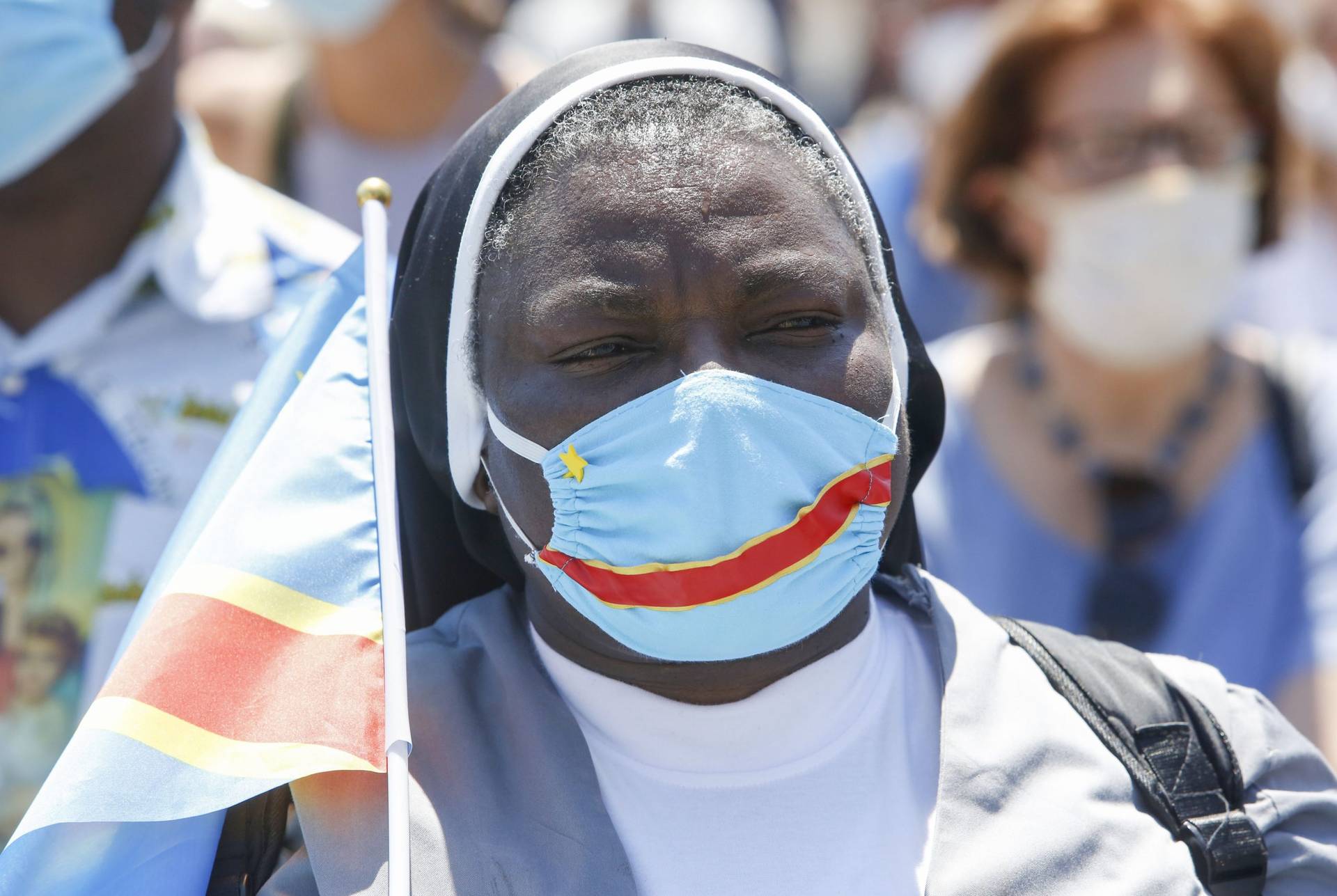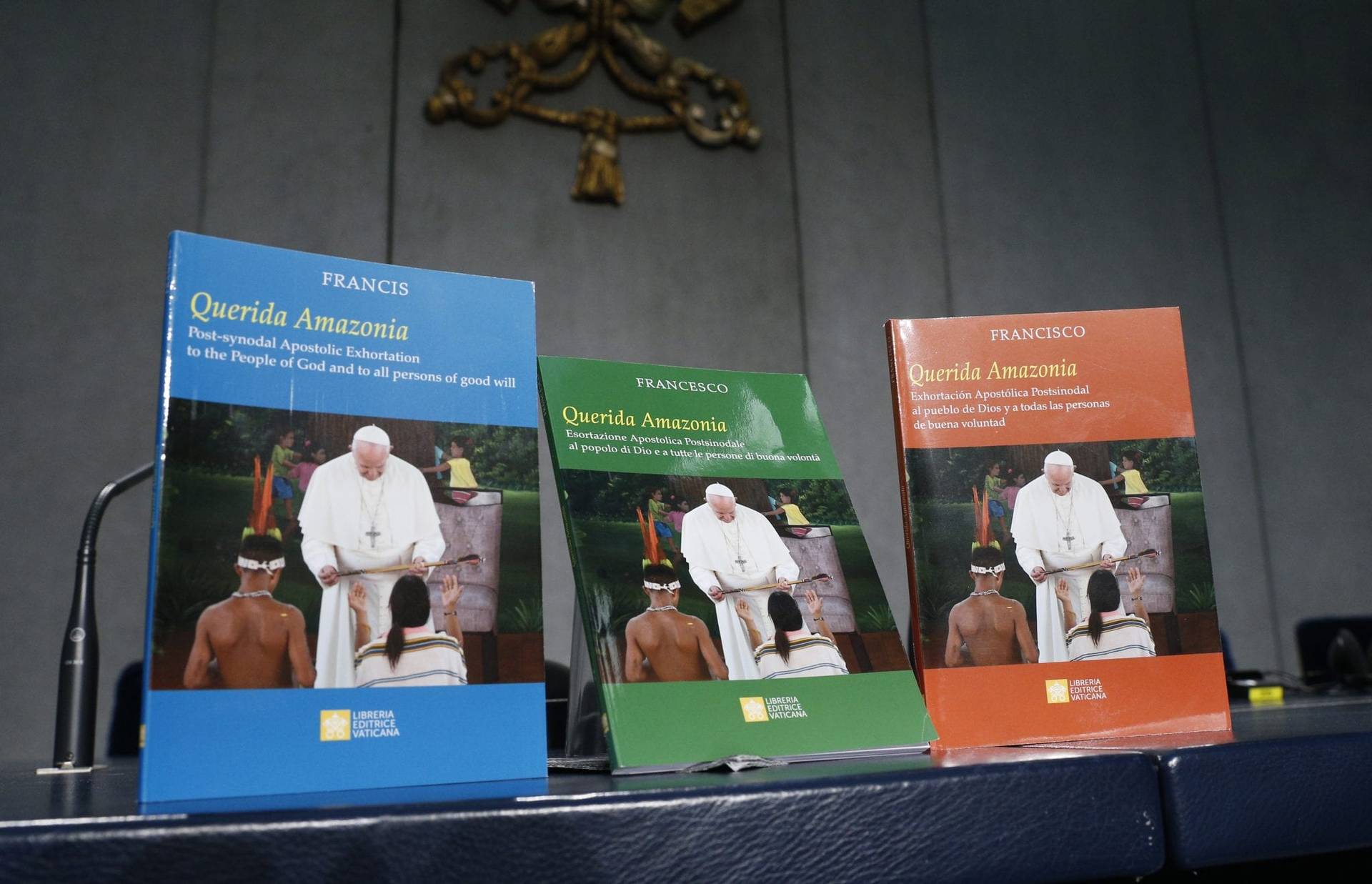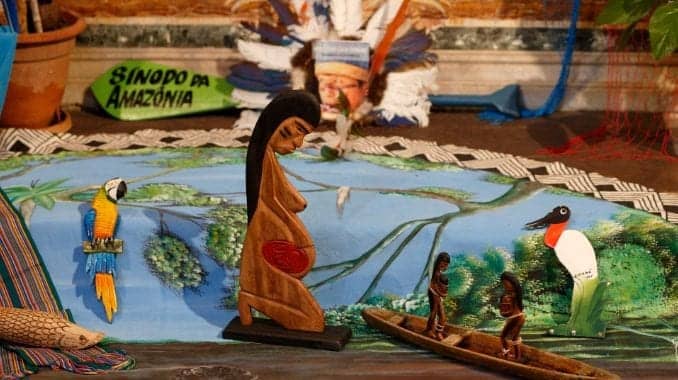ROME – Pope Francis launched his high-stakes summit on the Amazon into orbit Monday, opening things up by blasting ideologies that disrespect native and indigenous cultures and urging bishops and other participants not to “kick the Holy Spirit out of the hall” as the Oct. 6-27 event unfolds.
“Ideology is a dangerous weapon,” the pope said, opening the first working session of the Synod of Bishops on the Amazon.
“It’s reductive and leads us to exaggerate our pretense to intellectually understand [a culture] without admiring it or taking it up ourselves,” Francis said. Such “slogans,” the pontiff said, “serve to divide, annihilate and destroy,” saying their toxic consequences can be seen in the “extermination of the majority of indigenous persons” in the Amazon.
Nor is such disrespect confined to the past, Francis said, noting that just yesterday he’d heard a semi-joking complaint from someone about the feathered headdress one of the natives had worn inside the Vatican.
“What’s the difference between that and the birettas worn by some of the cardinals of our dicasteries?” the pope asked, drawing strong laughter from the synod hall.
Francis rued what he called a tendency to see some cultures as “second-class civilizations,” which, he said, “distances us from the reality of a people and separates us from them, which is disrespect.”
The pontiff also spent some time laying out his vision for a Synod of Bishops, saying it’s “not about who has more power to impose their own plans and ideas.”
“A synod is walking together, following the breath of the Holy Spirit,” Francis said. “The Holy Spirit is the principal author of the synod, so let’s not kick him out of the hall.”
In that spirit, Francis appeared to ask the roughly 185 bishops and 100 or so other participants in the synod to exercise caution when speaking to reporters during the synod.
“It could be damaging if I leave the hall and just say whatever I think without reflecting on it,” he said. “We’ve seen it at other synods,” asking participants to use “prudence” and a “soft touch.” In the past, he said, there’s sometimes been the impression of one synod inside the hall and another outside.
His last admonition to participants was to “not lose a sense of humor,” and Francis displayed that quality himself Monday morning. At one point he noted that after every four speeches in the synod there will be a four-minute pause for silence, and said some people had warned him such a break would be dangerous because people might go to sleep.
“At the synod for youth, we saw it was the opposite,” he joked. “They slept during the speeches, at least some of the speeches, and woke up for the silence.”
Francis spoke in Spanish, the most widely shared language in the Amazon synod.
The morning began with a procession in which the pontiff and some 300 bishops filed out of St. Peter’s Basilica after a prayer service, into a square that had been cleared of the public for the occasion, slowly making their way to the Vatican’s synod hall. Indigenous persons sang hymns both in native languages and Spanish, carried symbolic gifts and a native image of Mary in a small replica canoe, held aloft a multi-colored fishing net, and brandished images of the Amazon’s martyrs and St. Oscar Romero of El Salvador as well as posters calling for “integral ecology.”
Those martyrs memorialized by signs included Father Rodolfo Lunkenbein, a German missionary in Brazil shot to death at his Salesian mission in 1976, and Galdin Pataxo, an indigenous activist murdered in Brazil’s capital city by five upper-class youth in 1997.
Bishops and other participants were also given a small white bag with the synod’s logo, made entirely of natural fiber as a sign of the summit’s “green” ethos. More broadly, the Vatican plans to replant a stretch of Amazon rainforest sufficient to offset the entire assembly’s carbon footprint.
Following the pope’s remarks Monday, Italian Cardinal Lorenzo Baldisseri, secretary of the Synod of Bishops, was scheduled to provide a general overview of the meeting, while Brazilian Cardinal Claudio Hummes, the relator (chairman), was to discuss its key themes and ambitions.
Follow John Allen on Twitter: @JohnLAllenJr
Crux is dedicated to smart, wired and independent reporting on the Vatican and worldwide Catholic Church. That kind of reporting doesn’t come cheap, and we need your support. You can help Crux by giving a small amount monthly, or with a onetime gift. Please remember, Crux is a for-profit organization, so contributions are not tax-deductible.














